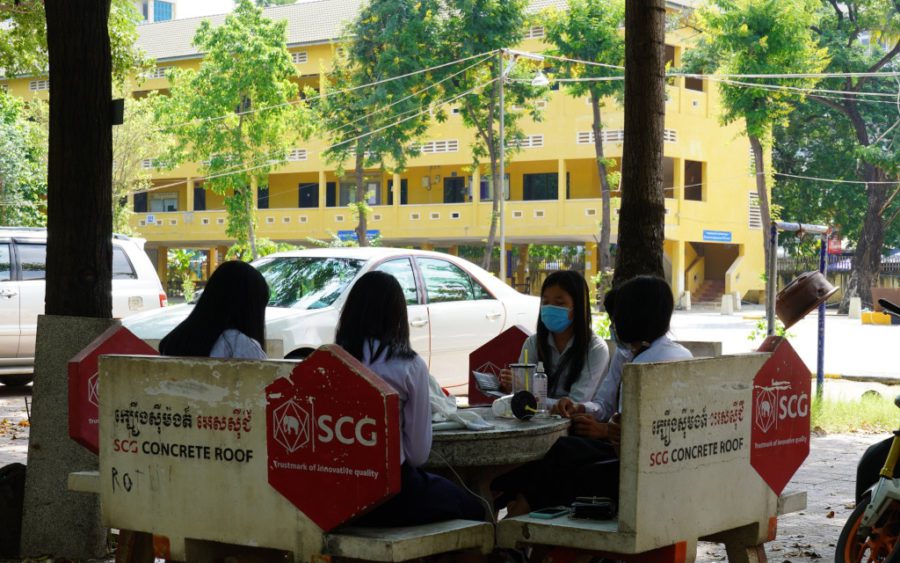Most schools in Tbong Khmum and Prey Veng are preparing to reopen on Monday, while Stung Treng has already begun in-person classes in select districts, provincial officials said on Thursday.
Prime Minister Hun Sen on Tuesday issued a Facebook directive calling on rural schools to reopen where there is less risk of Covid-19, citing the difficulties that poor and rural students have faced in accessing online education.
Children’s NGOs had already been calling for school reopenings after a year and a half of major disruptions due to the pandemic, saying children were less at risk of the disease.
Pav Sothy, Prey Veng’s provincial education department director, said authorities and administrators had prepared schools to reopen starting Monday from kindergarten through to high school.
“It’s not 100 percent, but it’s almost all schools,” Sothy said. The decision had been made after the provincial administration held a meeting with district governors on Wednesday, he said.
Sothy added that classes would be divided so no more than 15 students are present in any one classroom.
Officials have been cleaning and disinfecting schools, especially those that were used as Covid-19 quarantine centers. School directors and teachers were being briefed on schedules and dividing classes, he said.
Schools still must get approval from authorities, and those in high-risk Covid-19 areas would need to continue online classes.
Sothy added that the provincial education department still did not have data about how many students had dropped amid the pandemic, though the data should be available in about half a month, including the number of students who would not be sitting the grade 9 and 12 national examinations.
Keng Bunna, Tbong Khmum provincial deputy governor, said 80 percent of schools would reopen in the initial phase.
Authorities had selected schools they deemed low-risk, while quarantine centers were being moved to hotels, guesthouses and office buildings, Bunna said.
“The priority is the 9th and 12th grades, because they have to take their exams,” he said. “But for the locations that have no risk of infection, we will open from grade 1 to grade 12.”
Stung Treng provincial spokesperson Men Kong said a selection of the province’s schools had already reopened in five districts as a trial, notably excluding the provincial capital.
The reopening of schools had mostly gone smoothly, he said. “In some cases as we prepared to organize to open, the health authorities gave us information that they found [Covid-19] in the communes … so it was interrupted.”
Phnom Penh governor Khuong Sreng said briefly that if the Covid-19 situation remains stable, schools in the country’s capital could reopen in late September.
Foroogh Foyouzat, Unicef’s representative in Cambodia, said online learning was no substitute for in-person attendance, and studies have found that more children were suffering anxiety, depression and self-harm since the start of the pandemic.
“Prolonged school closures have a significant impact not just on children’s learning, skills attainment and fulfilling their potential later in life, but also on their physical and mental health,” Foyouzat said. “Moreover, access to online learning remains woefully uneven, with disadvantaged children — including those with disabilities, those affected by migration, and minorities — bearing the brunt of the shortcomings of distance education.”
She said that the longer children remain out of school, the less likely they are to return and noted the potential risks of dropouts, child labor and early marriage.
Reopening schools in rural areas first was about addressing difficulties accessing online learning, and Unicef “fully supports the prioritization of the most disadvantaged children, who are most likely to fall behind.”
However, all schools are less likely to be drivers of transmission in the community, and safe reopening can be considered everywhere.
Foyouzat said one of the keys to reopening schools was the need to re-engage students who had dropped out or fallen behind.
“[S]tudents will need tailored and sustained support to help them readjust and catch-up after the pandemic,” she said, “particularly the most disadvantaged ones who haven’t been able to engage in adequate learning during school closure, to help recover learning losses.”
Children under 12 were least at risk of Covid-19 but “most likely to be held back by these years out of school,” she added, urging priority support for younger children.













